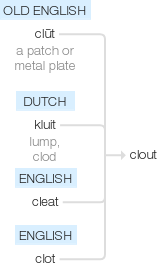Clout
Old English clūt (in the sense ‘a patch or metal plate’); related to Dutch kluit ‘lump, clod’, also to cleat and clot. The shift of sense to ‘heavy blow’, which dates from late Middle English, is difficult to explain; possibly the change occurred first in the verb (from ‘put a patch on’ to ‘hit hard’).
wiktionary
From Middle English clout, from Old English clūt, from Proto-Germanic *klūtaz, from Proto-Indo-European *gelewdos, from Proto-Indo-European *gel-(“to ball up, amass”). The sense “influence, especially political” originated in the dialect of Chicago, but has become widespread.
clout (third-person singular simple present clouts, present participle clouting, simple past and past participle clouted)
etymonline
clout (n.)
Old English clut "lump of something," also "patch of cloth put over a hole to mend it," from Proto-Germanic *klutaz (source also of Old Norse klute "kerchief," Danish klud "rag, tatter," Frisian klut "lump," Dutch kluit "clod, lump"); perhaps related to clot (v.).
In later use "a handkerchief," also "a woman's sanitary napkin." Sense of "a blow" is from early 14c., from the verb. Slang sense of "personal influence" (especially in politics) is by 1946, American English, on the notion of "punch, force."
clout (v.)
"to beat, strike with the hand," early 14c., from clout (n.), perhaps on the notion of hitting someone with a lump of something, or from the "patch of cloth" sense of that word (compare clout (v.) "to patch, mend," mid-14c.). Related: Clouted; clouting.
